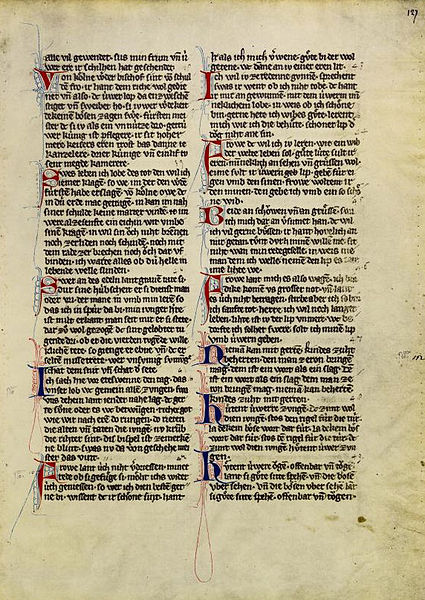I just found the coolest thing online while not translating Plinius epistula on the eruption of the Vesuvius -
this.
Isn't it
cool? Although I spent around fifteen minutes looking at all the portraits in the
Codex to find the little guy with the fiddle. He's from the picture of the
final singer - "
Der Kanzler", the chancellor.
The pictures were all taken from the legendary
Codex Manesse, the most well-known collection of German love songs that was compiled in the 14th century - a hundred years after the genre had reached its peak, so sadly the portraits are not as accurate and the heraldry is also dodgy, but since it is one of the few sources of Minnelieder which exist, its worth is inestimable. Most of the songs we're reading with my Middle High German seminar are from the
Codex. If anyone's interested, the University of Heidelberg has the it on their homepage
here.
I know there is nothing like modern medicine, technology, but like many a good little literature student in postmodern days I sometimes wish I could be a scribe in the middle ages. These pages are so beautiful, and I daresay I'd be quite content if I could spend my life creating such things:

Of course, it would also entail not marrying, but since Crocky would have been a nun as well (she better had!), I am convinced that I'd have had company. But then, as a nun, I would not have been allowed to copy out love songs, because there have been various concilliar and synodal edicts against this sort of thing thruought the middle ages, from the 8th century onwards. Hm. Life as a nun in love is hell. Hey, but I might have run away from the monastery at some point, I daresay that must have happened occasionally. Although that'd mean I'd ruin myself completely and break my vows. I might have been a novice.
On the other hand, it is very unlikely that I'd have been a novice, I would probably be married by now, and my dear brother would be on his way to become a smith. Well, my parents wouldn't even have met, but those are minor details. Crocky? Hmm... her father must have played on some kind of portative organ (like this one
here), but those were not used in churches back then, were they? And if he had been a church musician, Crocky's very existence would probably be endangered. Ah, she'd exist, and might even have been in a convent, but that's not very likely.
I might have taken the veil because no suitable husband could be found who'd marry me, and since my brother was going to take over the smithy, that wouldn't have mattered so much. Oh, hey, I probably would have worked in the smithy, anyway, maybe even as an official guild-member, as some guilds did have female members - only in the cities, though. Damn. I wouldn't have lived in a city.
So, I am this novice with a smith as a father and a smith-to-be as a brother, but Crocky's family consists almost entirely of musicians and teachers (music teachers) as I understand, so she'd have been what, the daughter of a minstrel at court, a church musician with lots to answer for or a wandering musician? I like the wandering musician. So, what does the daughter of a wandering musician do in the fourteenth century? She might have played the shawm like her father or sung to entertain people, or she might have been a dancer. But are novices allowed to attend this kind of mundane secular entertainment? Oh, yeah, this is the fourteenth century, no more enclosure - yes, I can go, if I want to. Or I met her at church. Oh, better not, as the seculisation had rather grave effects on the convents - more and more nuns have been accused of unchastity, apparently - so, not at church.
But then, she'd have had to move on, and would only have come back ages later! So even in the middle ages we'd have had a long-distance relationship. Typical, why can't she be in a convent?! Wasn't good enough for her, was it?
Had to be the life on the road, no?
Hrmph.
Good thing I can just phone her now.





